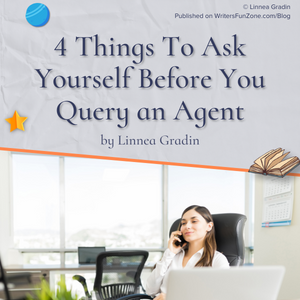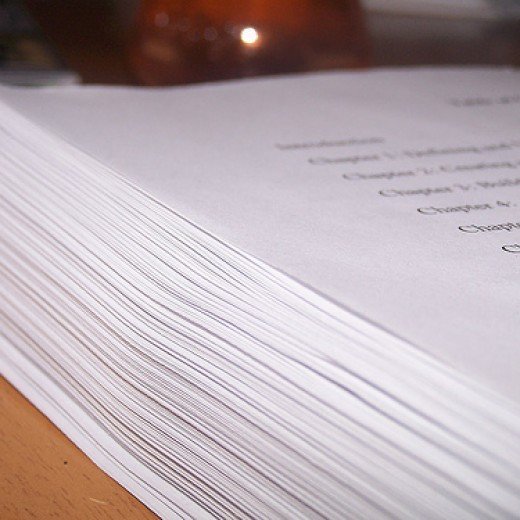4 Things To Ask Yourself Before You Query an Agent by Linnea Gradin
 Let’s welcome back Linnea Gradin as she shares with us “4 Things To Ask Yourself Before You Query an Agent.” Enjoy!
Let’s welcome back Linnea Gradin as she shares with us “4 Things To Ask Yourself Before You Query an Agent.” Enjoy!
***
If your dream is traditional publishing, one thing you’ll have to master, besides storytelling, is the fine art of querying.
Gone are the days when you could hand over a barely-edited manuscript directly to an editor and hope for the best; these days, most titles have to first pass through a rigorous polishing process and be accepted by a literary agent before it is even considered by a publishing house.
Before you start sending your manuscript to all agents you can think of, here are a few questions you should ask yourself to make sure you’re primed and ready to go.
Are you really ready?
Probably the most difficult but important question to ask yourself before sending your manuscript to agents is whether you are truly ready.
This requires some introspection and clearsightedness, as well as a little bit of timing and patience.
The thing is, querying can often take months, so some authors, thinking they’ll speed up the process, start sending out letters before the manuscript is even finished, assuming they’ll have enough time to finish it while they wait.
But with the exception of nonfiction, agents are almost exclusively looking for books that read like finished products, having gone through at least a couple of professional edits already (not just self-edits.)
Another thing authors forget to account for is that you may actually hear back from an agent earlier than expected.
Then you’ll have to either admit that you’re not actually done (and likely lose the deal) or pull an all-nighter to rush the remaining 20,000 words of an early draft (and likely lose your mental soundness, as well as jeopardizing your work’s quality).
That’s why you might want to hold your horses and make sure you only submit once you’re really ready, giving yourself the best possible chance to succeed.
Do you even need an agent?
For most people who want to go down the trad pub route, the answer to this question is a resounding “yes!”
An experienced agent will not only help you pitch your manuscript to publishing houses, but also negotiate a more beneficial contract, as well as offer support throughout the publishing process.
Not to mention that a large majority of publishing houses won’t even look at direct submissions from authors, so if it’s not coming from an agent, it doesn’t stand a chance.
Of course, if you’re self-publishing or submitting to smaller publishing houses that do accept direct submissions, you might not have a need for an agent, so make sure you research your options and publishers thoroughly.
Who is your ideal agent?
While you’re researching publishers, you might also want to consider what agents to submit to. Just like publishers specialize in genres, agents have their niches and styles they’re drawn to.
A big name agent who works for a famous agency might be able to get you a lucrative deal, but if they specialize in literary fiction while you’re writing epic fantasy, it doesn’t really make sense to send a query letter their way.
You want to pitch agents looking to acquire exactly the type of story you’re selling.
Additionally, an agent may be a perfect fit in terms of catalog, but if they already have their plate full, they’re unlikely to take more authors on.
In that case, one alternative is to go with a slightly smaller agency that is actively looking for new talent and has resources to invest in your career.
To find a good fit, you can look through literary agent directories and databases and sort for genre and location, then start making your shortlist.
How will you track your submissions?
After you’ve done your research, you can begin to write your irresistible query letters (plural!) and start submitting.
But remember: the more eyes you can get on your manuscript, the higher your chances of success.
At the same time, to catch the attention of an agent (or an agent’s assistant), you’ll need a thoughtful and personalized query letter.
This can get overwhelming pretty soon, so it’s a good idea to create a system to keep track of all your submissions.
A simple spreadsheet where you fill in the publishing house, date of submission, and other relevant information, is a good place to start.
Then, you can keep track of who has responded and who you need to follow up with.
Hopefully, you’ll end up with a couple of “yes”es and have multiple publication avenues to consider.
Querying can be scary — you’ve spent countless hours turning over every single phrase of your manuscript, nurturing your characters, and pouring yourself into the story.
Now it’s time to put it to the test — but it’s also an exciting step, bringing you one step closer to your dream.
Good luck!
***
ABOUT THE AUTHOR
![]() Linnea Gradin writes about writing and publishing over at Reedsy — a website that connects authors with publishing professionals and gives tips on topics such as how to self publish a book or how to translate a book.
Linnea Gradin writes about writing and publishing over at Reedsy — a website that connects authors with publishing professionals and gives tips on topics such as how to self publish a book or how to translate a book.





